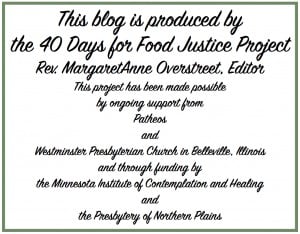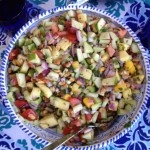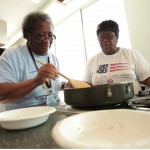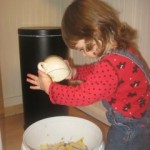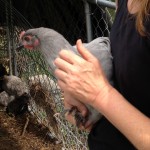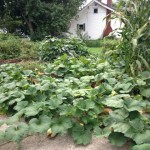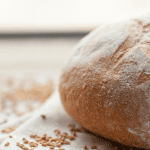Cooking Fresh
by Corene Everett
Cooking with fresh foods has been a lifelong learning experience, from childhood experiments in the kitchen to relying on the open air markets in China for food rather than a grocery store, to discovering the joys of Mollie Katzen, Deborah Madison, and Alice Waters. I’m no chef, but I cook simple meals using fresh ingredients for my family because I believe the best option for healthy, delicious food is what we prepare at home.
I’ve noticed, though, as I shop and talk with others, that the majority of Americans are not cooking with fresh ingredients. Statistics I’ve read recently state that as much as 70% of the average American diet is made of up of processed food. Because food processors add large amounts of salt, sugar, fat and chemicals to enhance shelf life and flavor, this food has contributed to many diseases like obesity, heart disease, diabetes and cancer.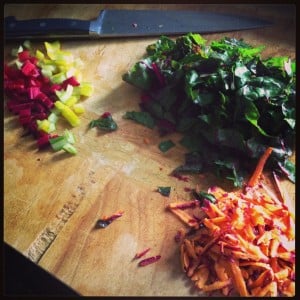
In his latest book “Cooked”, Michael Pollan argues that cooking is the “single most important thing we (can) do…to improve our health and general well-being.” Also, that it is “the most important thing an ordinary person can do to help to reform the American food system, to make it healthier and more sustainable.” The problem is, many of us do not have the skills needed to transform fresh ingredients into delicious meals.
Along with Dr. Debra Bell and Rev. Meg Overstreet, I have been teaching cooking classes at the Minnesota Institute of Contemplation and Healing, as a way of helping people eat better by learning to cook healthy everyday meals. Our introductory class consists of two 3-hour-long sessions: making salad dressings from scratch, green salads, grain salads, and hummus, and then making stir-fries with flavors from China, Thailand and India.
We cover topics like buying spices in bulk where they’re freshest, choosing the best oils that have not been chemically refined, cooking whole grains, and using lots of vegetables in meals.
Last spring we were approached by Public Health to teach a class on shopping and cooking from the farmer’s market, funded by a grant from the State Health Improvement Project. The plan we worked out was to take a group to a farmer’s market and then bring them back to a kitchen and teach basic skills used to prepare the vegetables. Anyone was welcome to attend, but the target audience was those that Public Heath works with, many who lack a dining table, a cooking pot, or even a stove. We didn’t plan to talk much about organic food or shopping at a natural foods store. Our goals were to encourage them to prepare and eat real food, and to give them skills to utilize what vegetables are being grown and sold in our community.
We started with a list of what vegetables a person might encounter at farmer’s markets here in NW Minnesota, for the growing season. Our list included: carrots, broccoli, sweet potatoes, radishes, parsnips, beets, chard, onion, green beans cauliflower, snow peas, tomatoes, peppers, cucumbers, bok choy, summer squash, and asparagus. Whatever vegetables were not available locally when the class was held, we purchased at the grocery store.
We decided to teach techniques that would help in preparing these vegetables: roasting, steaming/blanching, stir-frying/sautéing and making a dressing. We roasted sweet potatoes, summer squash, and beets. We steamed asparagus to put on top of a wild rice salad (wild rice is a local food, harvested in our region) and prepared a lettuce salad with carrots, snow peas, cucumbers, radishes, and peppers. The bok choy, green beans, carrots, broccoli and onions went into a simple Asian stir-fry. The students all seemed to enjoy the food and shared parts of the experience that they planned to take with them to their own kitchens.
I encourage you to step into the kitchen and prepare a meal without processed ingredients this week. And perhaps in your own way you can help others learn to prepare delicious meals as well. It can be as simple as a conversation about what you prepared, sharing a whole foods recipe, starting a conversation about how to prepare a vegetable that’s in season, taking someone with you to the farmer’s market, or inviting someone to eat a meal you’ve cooked. When it comes to cooking with fresh food, there are so many scrumptious possibilities.
———————
Photo by Corene Everett
Corene Everett is passionate about cooking and eating local, seasonal food while living in Crookston, Minnesota with her husband Trey and 3 kids. She is part of the Minnesota Institute of Contemplation and Healing, church musician, high school accompanist, and environmental enthusiast.
———————————-
Lenten Calendar for MARCH 24
Read Matthew 13:31-33. Sign up for a healthy cooking class or invite friends to come together to prepare a healthy meal.
————————————
Sign up to receive the daily meditations by email, or like us on Facebook.
We need your stories!
We’re already looking ahead to the 40 Days for Food Justice Project for 2016 and we’re looking for more stories, experiences, prayers and resources about food justice and food injustice.
If you would like to contribute – or would like to recommend a contributor – please send us an email and let us know.
About:
In addition to being the founder and editor-in-chief of the “40 Days for Food Justice Project”, the Rev. MargaretAnne Overstreet is a mom, a Presbyterian pastor, and a certified Health Coach. She does ministry with and among the good people of Westminster Presbyterian Church in Belleville, Illinois, where she gets her hands dirty in the community garden and, every Sunday, preaches with bare feet. She treasures family time, relishes every opportunity to teach and write about food justice, and loves to play outside with her dogs. Find out more about her at www.AnInBetweenPlace.com

